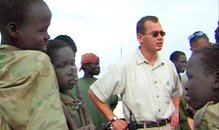Lundin Oil employed child soldiers
“Ian Lundin must have realised that the company’s presence presupposed that child soldiers were risking their lives – and presumably also lost them,” writes Bengt Nilsson.

Writer and journalist Bengt Nilsson claims that Lundin Oil resorted to the use of child soldiers in Sudan.
In the photo: Ian Lundin and child soldiers from Sudan
“No one was driven out because of our presence there,” said Ian Lundin in a radio interview on March 21. The conversation was about the accusations against his company Lundin Oil and its operations in southern Sudan around the turn of the century. In Dagens Nyheter, he said that same day that he had “noticed” that child soldiers were often to be found around oil extraction sites in the Sudan. But he denied that these soldiers were associated with the protection of the company’s operations.
We must have clarity about this. To what extent was the civilian population in the oil districts of Sudan adversely affected by the presence of Lundin. Did Lundin employ child soldiers or not? This last question is the easiest answer. Yes, Lundin used child soldiers.
In the spring of 2001, I accompanied Ian Lundin to the town of Rubkona in southern Sudan. I was reporting for the TV programme Agenda. We visited the militia group South Sudan Unity Movement, SSUM, which guaranteed Lundin Oil’s security in the area. Ian Lundin talked to the acting commander James Lial Diu.
The leader of the SSUM was called Paulino Matip. He was supported by the government in Khartoum. He was distinguished by an extreme ruthlessness.
Together with Ian Lundin I travelled along the road that Lundin had built. During a short stop a group of armed child soldiers suddenly appeared. There can be no doubt whatsoever that they were associated with the SSUM. The militia group protecting Ian Lundin.
The situation in the area was such that it was quite impossible for anyone to carry on any operations without military protection. Ian Lundin has since confirmed this in an interview.
I made extensive journeys in southern Sudan during and after the war, and met many child soldiers. Some of them told me that they had become members of a militia group or guerrillas so as to get a meal every day. Others were forcibly recruited. All the armed groups used child soldiers. The militias, the government army and the guerrilla movement, the SPLA.
Rubkona was inundated with people who had fled from the countryside because of the fighting. This was, however, not a new phenomenon. It had occurred before Lundin got the idea of building a road and drilling for oil. It also occurred later. To what extent, then, was Lundin Oil responsible for the mass exodus? This is a central question, and the idea is, of course, that the Swedish prosecutor Magnus Elving will try to answer it. It will not be easy.
The SPLA guerrilla movement won the war and formed the government in the new Republic of South Sudan. The vice-president in that government is Riek Machar. He was a founding member of the SPLA guerrillas, but subsequently broke with its leader John Garang in 1991. He went over to the side of Khartoum, then abandoned them and set up a militia group of his own which collaborated with, among others, Lundin.
He should have been a principal witness in the investigation into Lundin’s guilt in the war, but I can assure you that he will be difficult to talk to.
I visited South Sudan a year ago to interview, among others, the information minister Barnaba Benjamin. He is a veteran of the SPLA and said that he had met Lundin a long time ago. As we know, Lundin sold its business in southern Sudan in 2003. “But,” said Benjamin, “Lundin are always welcome back”.
Philip Aguer is also a guerrilla veteran, and today the spokesman for the Army. He said that he disliked the Chinese oil company which dominates in South Sudan. He would prefer to see Western oil companies there, as “they have a regard for human rights; they listen to the people’s suffering and that is why they left (southern) Sudan.”
Quite recently South Sudan deported the head of the Chinese oil company. He was accused of conspiring against the state. At the same time, the country has stopped all oil production and is said to have opened negotiations for new collaboration with Western oil companies.
All this taken together means that it will be very difficult to clarify what Lundin Oil were guilty of during the war. It is not in the interests of the South Sudan government to question Lundin’s conduct.
What is clear is that Lundin made use of a militia who used child soldiers. Lundin must have realised that the company’s presence presupposed that child soldiers were risking their lives, and presumably also lost them. I consider that to be serious enough.
Bengt Nilsson is a journalist, filmmaker and writer
original Swedish article:
http://www.expressen.se/debatt/lundin-oil-anlitade-visst-barnsoldater
- Database Search
- Unpaid Debt A comprehensive overview of the role of the Lundin Consortium in the oil war. ECOS calls upon the Swedish, Austrian and Malaysian governments to investigate whether, as a matter of international law, Lundin, OMV and Petronas 'were complicit in the commission of war crimes and crimes against humanity by others during the period 1997-2003.’ In response, the Swedish Public Prosecutor for International crimes opened a criminal investigation into ‘links between Sweden and the reported crimes’.
- In Depth For more specific information about the Lundin court case please visit the Unpaid Debt dossier.



